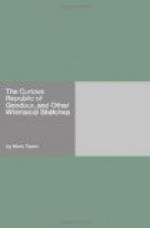And now a curious thing developed itself—a sort of emulation, whose object was voting power! Whereas formerly a man was honored only according to the amount of money he possessed, his grandeur was measured now by the number of votes he wielded. A man with only one vote was conspicuously respectful to his neighbor who possessed three. And if he was a man above the common-place, he was as conspicuously energetic in his determination to acquire three for himself. This spirit of emulation invaded all ranks. Votes based upon capital were commonly called “mortal” votes, because they could be lost; those based upon learning were called “immortal,” because they were permanent, and because of their customarily imperishable character they were naturally more valued than the other sort. I say “customarily” for the reason that these votes were not absolutely imperishable, since insanity could suspend them.
Under this system, gambling and speculation almost ceased in the republic. A man honoured as the possessor of great voting power could not afford to risk the loss of it upon a doubtful chance.
It was curious to observe the manners and customs which the enlargement plan produced. Walking the street with a friend one day he delivered a careless bow to a passer-by, and then remarked that that person possessed only one vote and would probably never earn another; he was more respectful to the next acquaintance he met; he explained that this salute was a four-vote bow. I tried to “average” the importance of the people he accosted after that, by the-nature of his bows, but my success was only partial, because of the somewhat greater homage paid to the immortals than to the mortals. My friend explained. He said there was no law to regulate this thing, except that most powerful of all laws, custom. Custom had created these varying bows, and in time they had become easy and natural. At this moment he delivered himself of a very profound salute, and then said, “Now there’s a man who began life as a shoemaker’s apprentice, and without education; now he swings twenty-two mortal votes and two immortal ones; he expects to pass a high-school examination this year and climb a couple of votes higher among the immortals; mighty valuable citizen.”
By and by my friend met a venerable personage, and not only made him a most elaborate bow, but also took off his hat. I took off mine, too, with a mysterious awe. I was beginning to be infected.
“What grandee is that?”
“That is our most illustrious astronomer. He hasn’t any money, but is fearfully learned. Nine immortals is his political weight! He would swing a hundred and fifty votes if our system were perfect.”
“Is there any altitude of mere moneyed grandeur that you take off your hat to?”
“No. Nine immortal votes is the only power we uncover for that is, in civil life. Very great officials receive that mark of homage, of course.”




